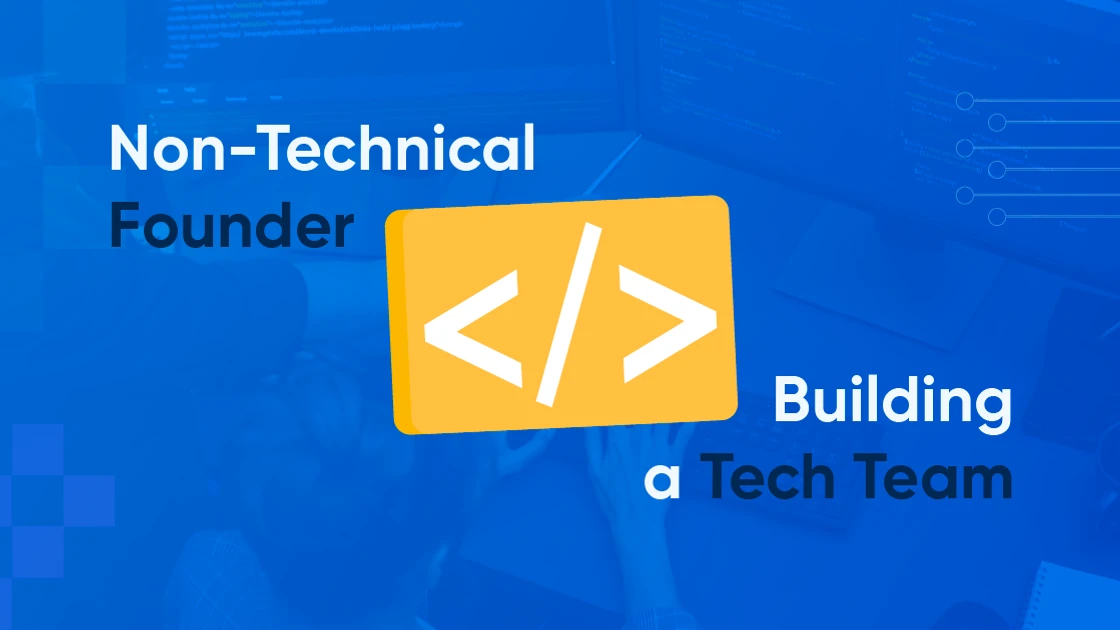Let’s face it. If you're a founder who doesn’t come from a technical background then building a tech team can feel like being thrown into the deep end of the pool without knowing how to swim. You might have a brilliant business idea, a clear vision, maybe even funding.
But when it comes to hiring developers and assembling a proper product team, it gets murky, confusing, and sometimes, downright frustrating.
If you’re not sure what skills you really need, exploring the best tech stack for a startup can help you understand which technologies and developer expertise matter most.
The Pain Points
Building a tech team when you’re not technical isn’t just hard, it’s a minefield of unknowns. You’re trying to move fast, but everything feels slow and uncertain. Everyone tells you to “hire smart,” but no one tells you how. Suddenly, you’re knee-deep in resumes, buzzwords, timelines, and tech decisions you don’t fully understand. And all you want is a team that can just... build the thing. Sound familiar?
Let’s break down what really makes this process so frustrating, and why so many non-technical founders get stuck here.
Everyone Sounds the Same on Paper
One of the first problems non-technical founders run into is hiring. You post a job on LinkedIn or AngelList or wherever. In come a bunch of resumes. You open five of them and... they all look the same. All the developers have listed React, Node, Python, Git, Agile, Docker, AWS. Half of them have side projects. All of them claim they’re passionate about clean code. What do you even look for? How do you shortlist?
And here’s the thing – you can’t tell who’s actually good at coding and who’s just saying the right words.
The Interview Struggle is Real
Technical interviews are hard enough when you're technical. But when you’re not, you're just... kind of guessing. You ask some general questions about experience, projects, maybe some cultural fit stuff. But can you really assess if someone writes scalable, maintainable code? Probably not. You might bring in a freelancer to "help" with the interview, but then you're just trusting someone else with a make-or-break hiring decision. Risky.
Code Quality
Another problem is that once you hire someone, you really don’t have any way to know if the code they’re writing is any good. Maybe it works. But is it going to break in 3 months? Is it secure? Will another developer be able to understand it? Is it following best practices? You just don’t know. And not knowing is scary.
When They’re Stuck, So Are You
When your developer gets stuck on a technical problem, you can't help. You don't even understand what they’re stuck on. So you're waiting for them to figure it out, Googling stuff you don't understand, and hoping they know what they’re doing. Spoiler: sometimes they don’t.
Talking Different Languages (Literally)
You want something done a certain way. You explain it in business terms – "I want a feature where users can upload documents and get real-time feedback." And the developer is just... blank. They start asking technical questions you don't get. Or worse, they misunderstand and build the wrong thing. And now you're frustrated, and so are they.
Are They Taking Me for a Ride?
We hear this all the time. A developer says something will take three weeks, and you’re thinking, “Isn’t this just a form?” But you nod along, because you’re not the tech expert.
It’s frustrating not knowing if timelines are fair or if things are being overcomplicated. That doubt grows, and soon every delay feels suspicious. To understand the basics of software project progress, you might want to read about what is POC in software development. You need someone who tells it straight, shows their work, and keeps you in the loop—without the tech jargon.
The Myth of the All-in-One Developer
Here’s another mistake: assuming a developer can do it all. You hire one person and expect them to build the backend, frontend, write tests, deploy to AWS, and also do QA. That leads to burnout, frustration, and half-baked products. You need roles like Tech Lead, Developer, QA, UI/UX – but if you’re non-technical, you may not even know what these roles are supposed to do. You’re setting both yourself and your developer up for failure.
Retention Nightmares
Let’s say you do find a great developer. Congrats! But now you have to keep them. Competitive salary. Career growth. Meaningful work. But startups are chaotic, and engineers have options. If they leave, you're back to square one. And finding a replacement quickly? We’re back to the same painful process.
This is why many non-technical founders find IT staff augmentation services helpful; they bring experienced developers who follow proven standards and save you from hiring headaches.
So What's the Smarter Way?
If you're a non-technical founder, you shouldn't have to become a CTO overnight. That’s not your job. Your job is to drive the vision, understand the market, and grow the business.
That’s where services like Crewmate come in.
Meet Crewmate: We Build Dev Team for You
Crewmate helps founders build full, ready-to-go tech teams – without the hiring headaches. No resume screening. No interviewing. No micromanaging.
You tell us what you want to build, and we put together the right team. Backend, frontend, QA, DevOps, UI/UX, all covered. You don’t have to worry about team structure. You don’t need to micro-manage timelines. We speak both tech and business, and act as a bridge between your vision and working software.
Need to scale fast? We can add engineers in 48 hours. Not happy with someone? We replace them instantly. We take care of retention, quality, and delivery, so you can focus on your startup.
And because everything is transparent, with proof-of-work timesheets, direct communication, and regular delivery updates, you’re always in the loop.
Why Founders Love This Approach?
Here’s what happens when you stop trying to build your tech team the hard way and start building the smart way with a platform like Crewmate:
- You get momentum from day one: No more hiring delays, no more spinning your wheels. Your idea starts moving the moment you say “go.”
- You actually sleep at night: Because you’re not constantly wondering if the dev you hired is stuck, burned out, or ghosting your messages.
- You speak your language, i.e., business, and we translate it to code: No tech-splaining. No awkward meetings. Just clear conversations about features, timelines, and outcomes.
- You stay lean, fast, and in control: You don’t need a bloated in-house team to build something amazing. With Crewmate, you stay agile and ready to adapt without wasting time or money.
You have a team that feels yours: Not random freelancers. Not a faceless dev shop. A team that’s synced to your product goals and startup rhythm — and that actually gives a damn about what you're building.
Final Thoughts
Building a product as a non-tech founder is hard. You know what you want, but not always how to build it. That doesn't mean you're not qualified to lead a tech company. It just means you need the right partner. If you’re curious about different types of software and which ones might fit your business, it’s worth exploring before you start.
Don’t waste time second-guessing hires, struggling with retention, or wondering if you're being overcharged. Let Crewmate help you build your dream product, the smart way.
Focus on your business. Let us handle the tech.
Want to talk to someone? Book a free call with Crewmate today.


